# Custom Logic Automation Custom logic upkeeps allow you to define specialized conditions directly within your smart contract to determine precisely when the upkeep should be executed. Unlike simpler trigger mechanisms, custom logic gives you complete control over when your functions run. In this example, we'll create a time-based trigger for a counter function similar to our previous lesson. However, instead of a standard time-based upkeep trigger, like we used for the `TimeBased` contract, we'll implement it using custom logic trigger to demonstrate this approach's flexibility in a contract called `CustomLogic`. At the heart of custom logic automation is a simple boolean return value. Your contract will include a function called `checkUpkeep` that evaluates conditions and returns either `true` or `false`. When this function returns `true`, Chainlink Automation executes your designated upkeep function called `performUpkeep`. These functions form the required `AutomationCompatibleInterface` custom logic compatible contracts must implement. While we're using time as our trigger condition in this example for simplicity, custom logic can evaluate any on-chain condition or combination of conditions you can express in Solidity. ## Creating the Custom Trigger contract Create a new file in the `contracts` folder in Remix (again, in the "Automation" workspace) named `CustomLogic.sol` with the following content from the [course code repo](https://github.com/ciaranightingale/chainlink-fundamentals-code/blob/main/automation/CustomLogic.sol). ### Code walkthrough Let's quickly walk through this code: - The `constructor`: This will enable us to set an interval for updates on deployment via the constructor parameter `_updateInterval`. This interval is in seconds. When we deploy this contract, we will set the interval to `300` or five minutes. It also sets the `lastUpdatedTimestamp` to the `block.timestamp`, which is the block time at deployment. - For the contract to be compatible with custom logic Automation, the `AutomationCompatibleInterface` must be inherited. It requires two functions to be implemented: - `checkUpkeep`: This function should contain the logic to determine if the contract is ready for upkeep. If it is, it will return `true`. Otherwise, it will return `false`. - `performUpkeep`: This is the function run by Automation to execute the upkeep. It contains the logic that is run when the upkeep is performed. ## Deploying & verifying the CustomLogic contract To deploy the contract to Sepolia, follow the steps in the previous lessons. There is a difference this time: We need a constructor parameter! Remember to pin the deployed contract instance to the workspace to ensure it persists if Remix is reloaded. - Set the `_updateInterval` constructor parameter to `300` (this equals 5 minutes), and click the **Deploy** button. 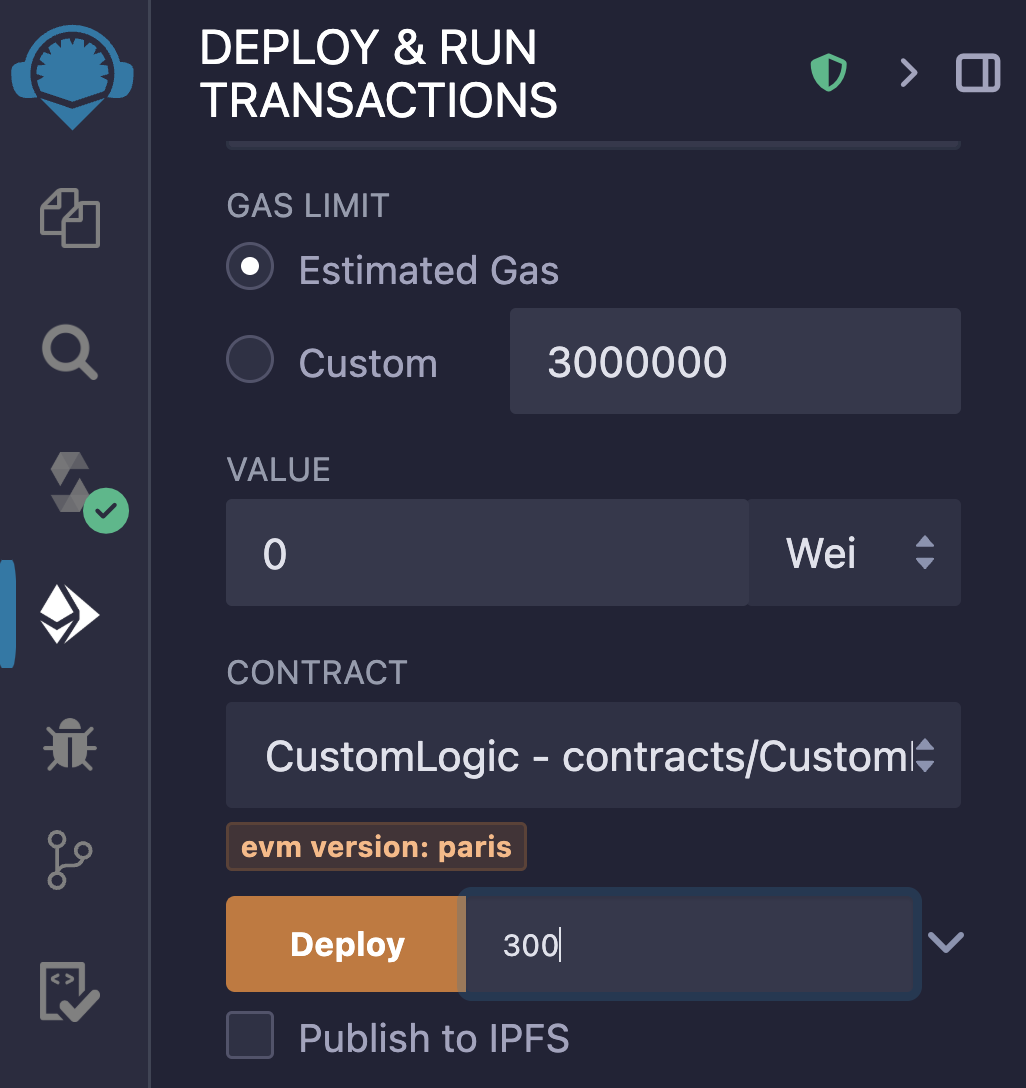 - Once the contract is deployed, you can **verify it on [Etherscan](https://sepolia.etherscan.io/)** using the process outlined in the time-based automation lesson. ### Flattening files We imported contracts, which means you’ll need to flatten the file first (put the code all into a single file) and then paste that code instead of just the `CustomLogic` code into the verification process. You can do this in the File Explorer by right-clicking the `CustomLogic.sol` file and clicking **Flatten**. 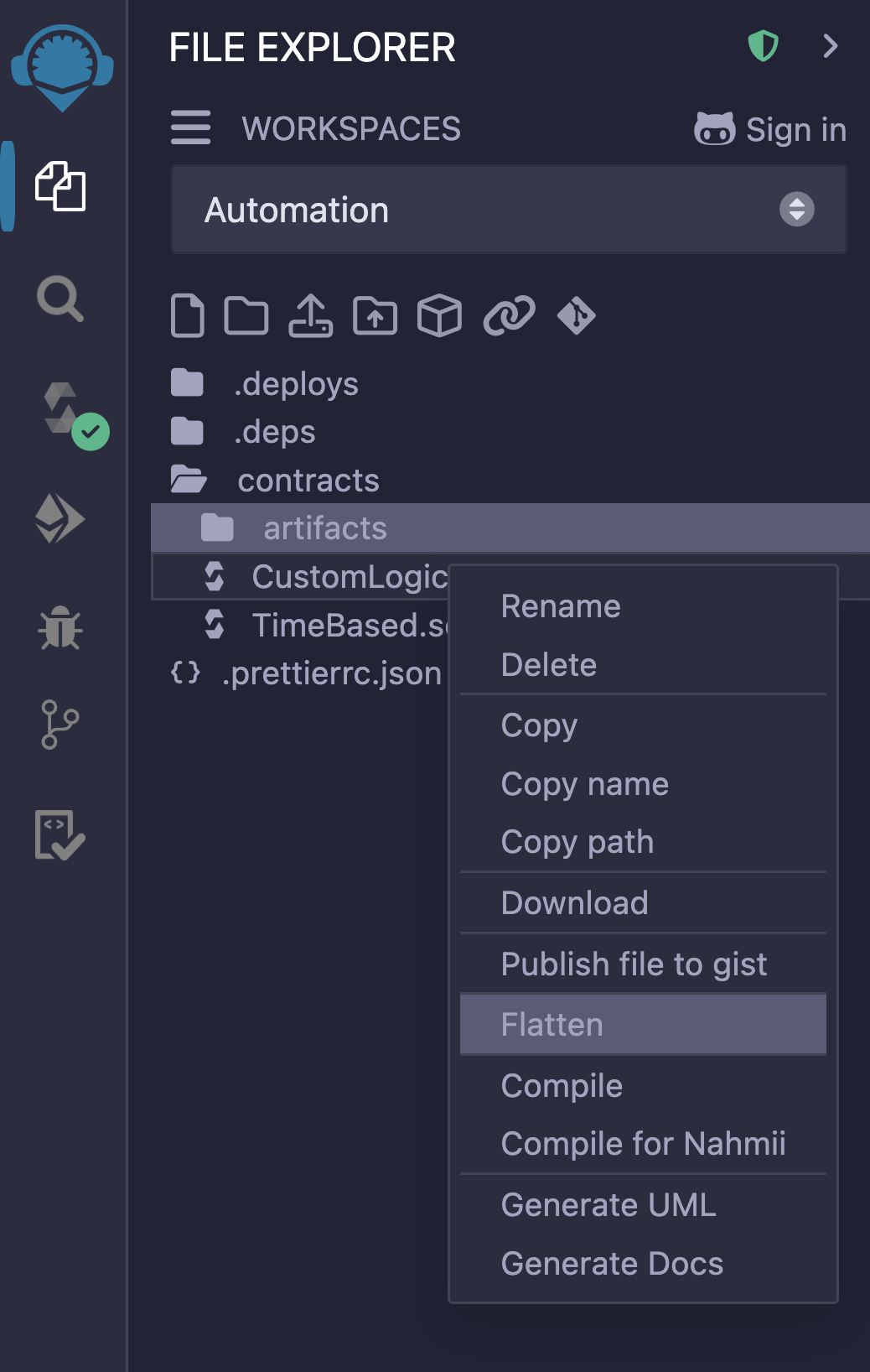 - Now you can copy the flattened code in `CustomLogic_flattened.sol` and use it for verification. 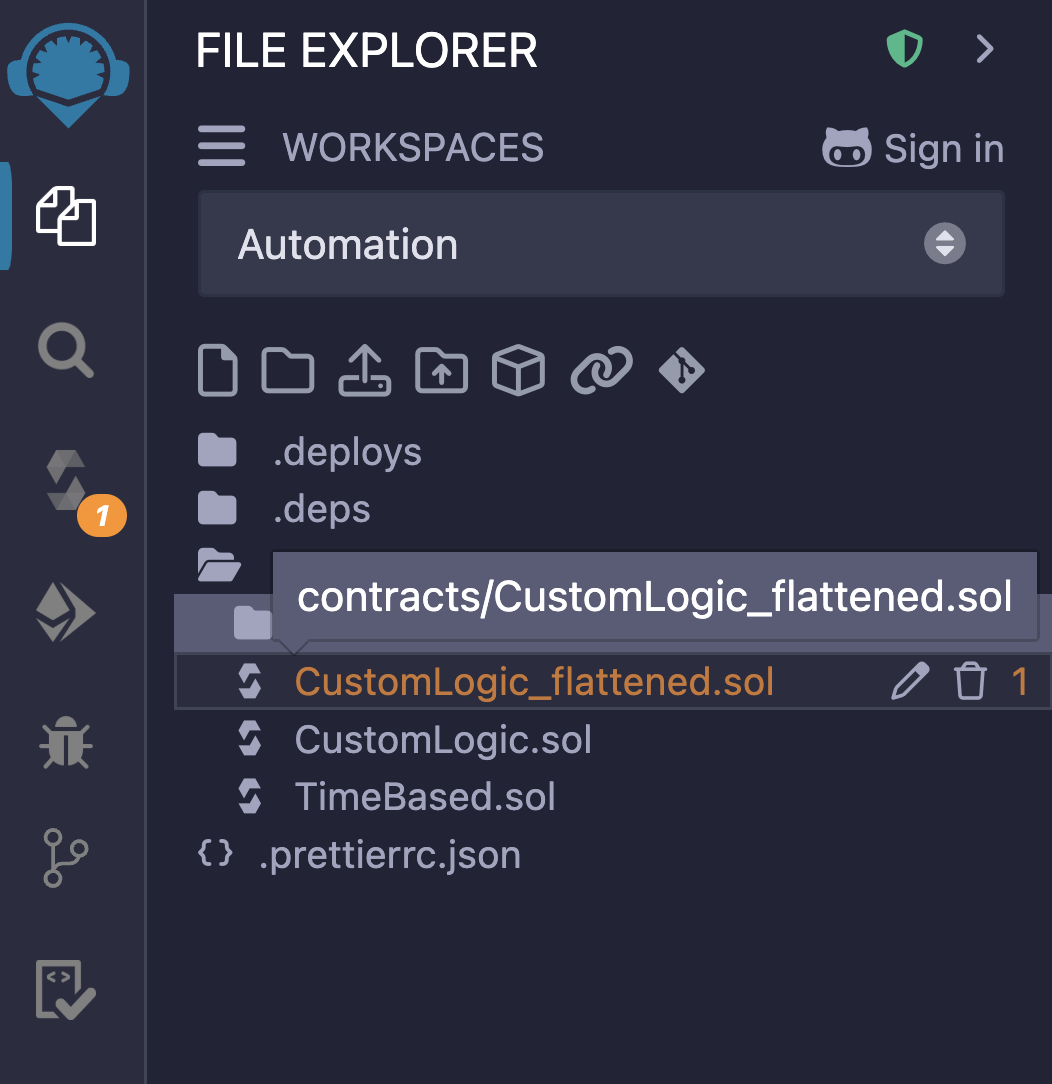 ## checkUpkeep - Once five minutes have passed, `checkUpkeep` will return `true`. This indicates that the automation system will run `performUpkeep` once we have setup a custom logic upkeep. **Note**: To manually call the `checkUpkeep` and `performUpkeep` functions, pass an empty bytes array as the function parameter: 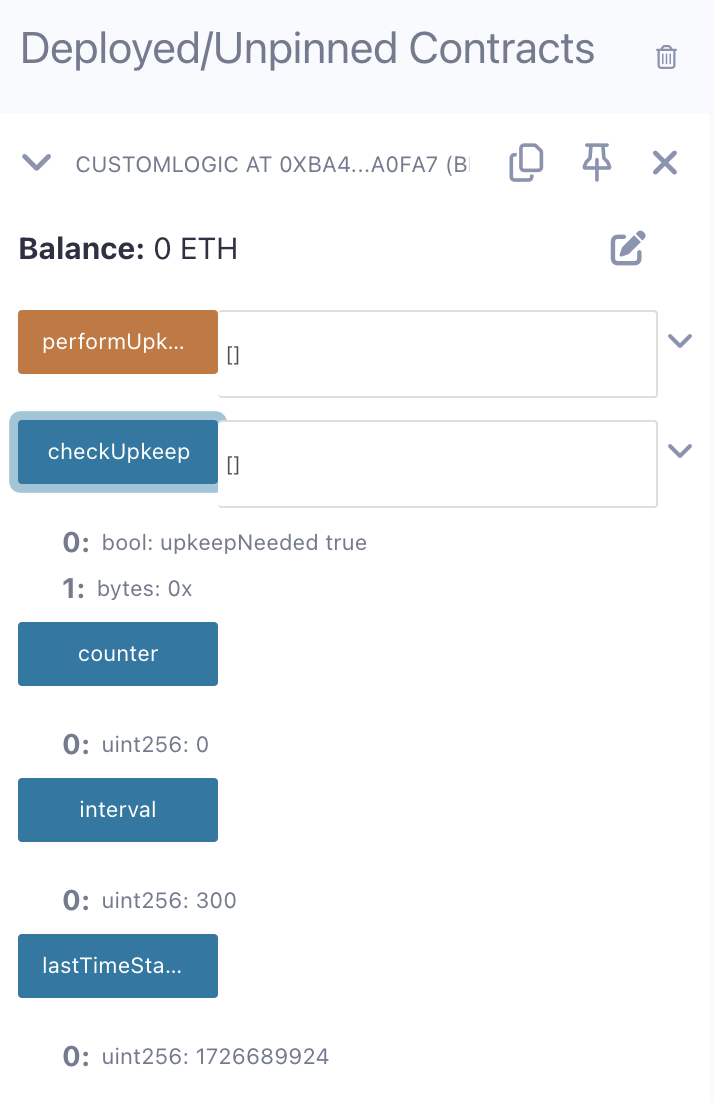 ## Register Custom Logic Upkeep With the contract deployed, we can head to the [Chainlink Automation app](https://automation.chain.link/) and create the automation job to enable automatic counting. - This time, we’ll select **Custom Logic** and enter the address of our deployed contract, then click **Next**. 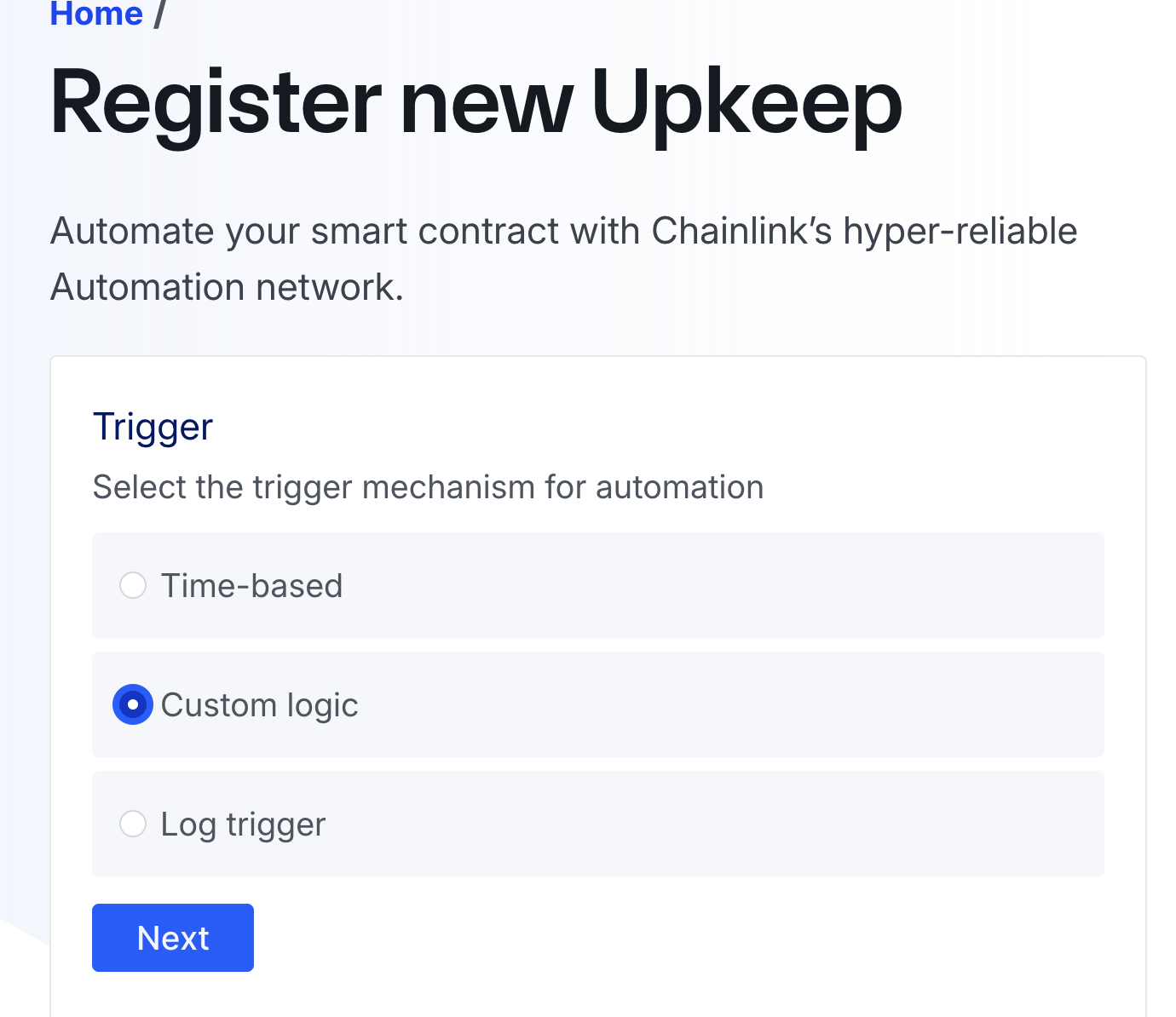 - Fill in the **Upkeep details**: - **Upkeep name**: A name for the upkeep visible on the Automation dashboard, e.g. **"TimeBased Counter"** - **Admin Address**: This will be your connected wallet by default, but you can change which address will be the admin for the upkeep here. - **Gas limit**: The maximum amount of gas your selected function for upkeep will need to use. By default, this is `500_000`. - **Starting balance**: A starting balance of LINK is used to pay for Chainlink Automation. In this example, `5` LINK will be sufficient. - The **Project information** is optional; we will leave it blank. 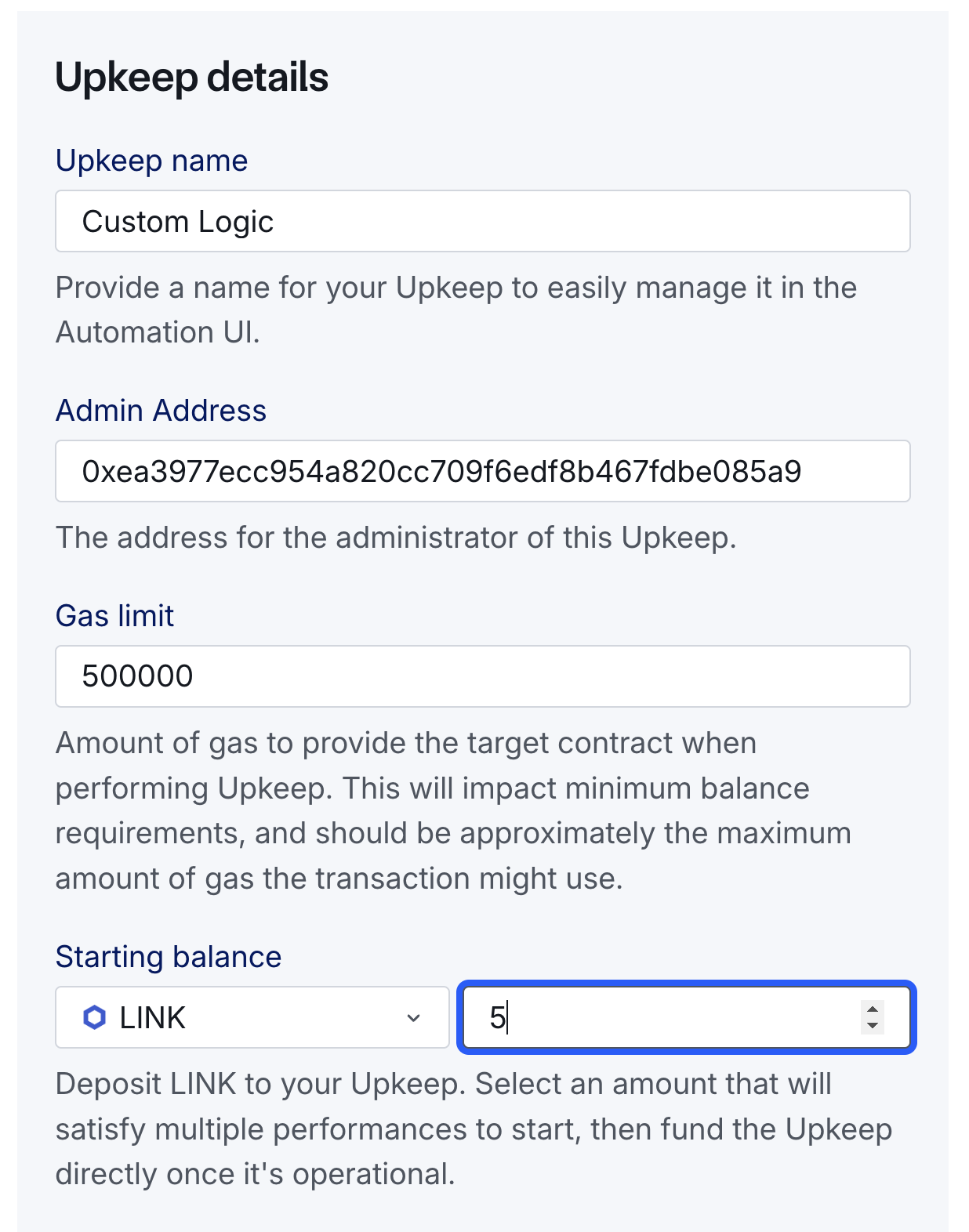 - Confirm the registration request and sign the message to verify your ownership of the upkeep. - The **upkeep page** provides a quick overview that shows the upkeep status, such as when it was last run, the current balance of LINK, and how much LINK has been spent.  - The **details section** gives you all the information about the upkeep, such as when it will run next and what function it will call. 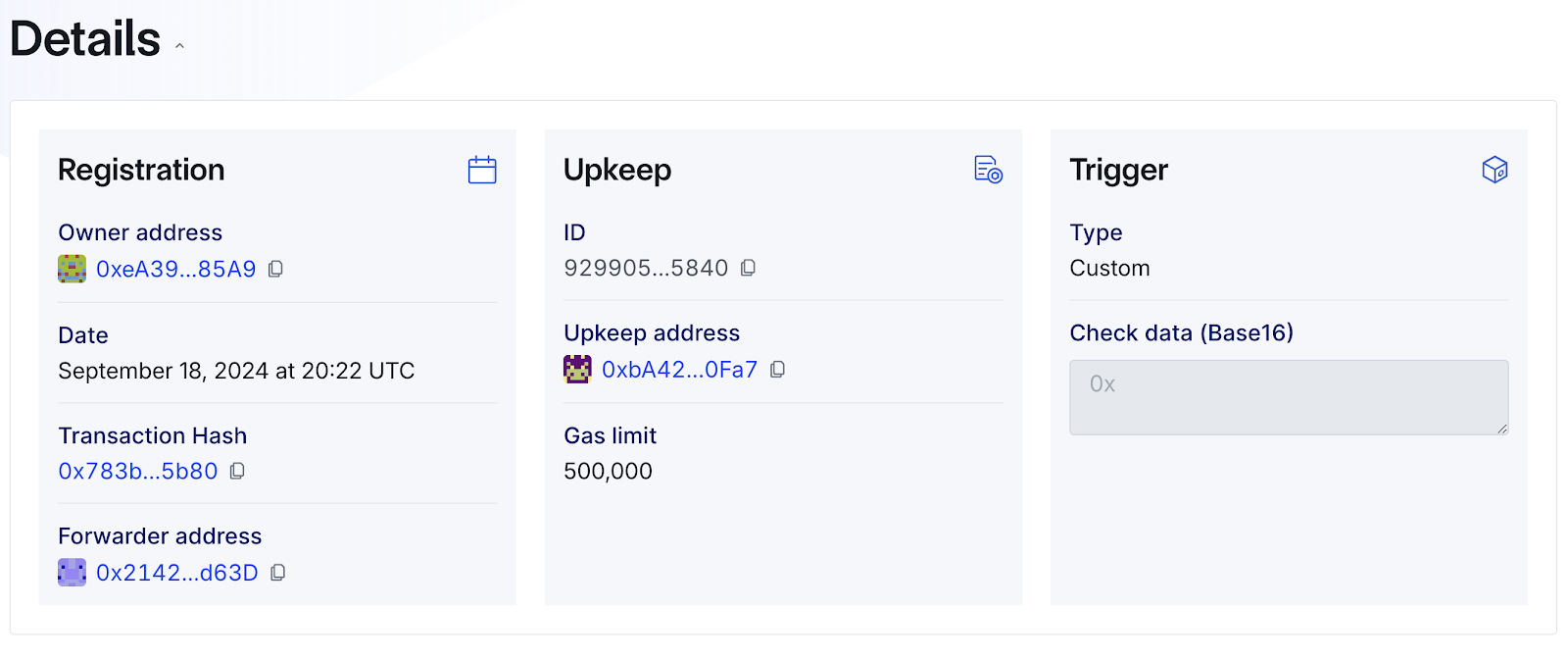 The **history section** shows the history of the upkeep, including every time it’s run. Once five minutes have passed, you should be able to refresh the page and see that the upkeep has been completed.  If you head back to Remix, you can see the value of `counter` has increased after 5 minutes has passed. The upkeep will continue until it runs out of LINK or is paused. 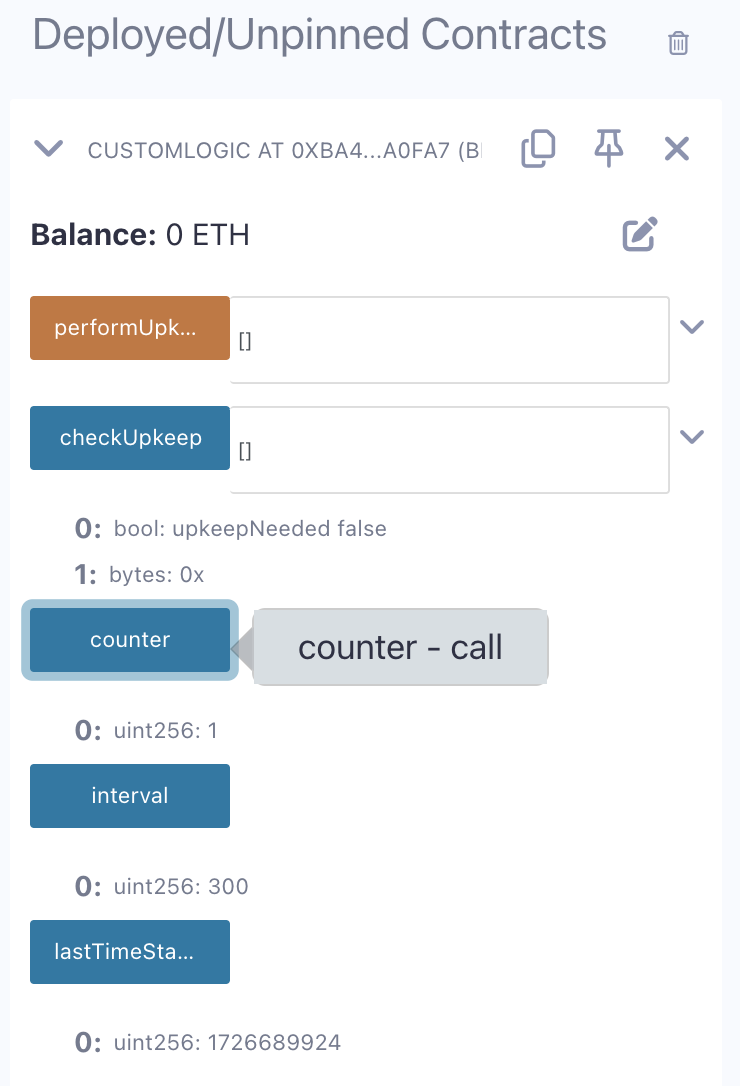
Custom Logic Automation
Custom logic upkeeps allow you to define specialized conditions directly within your smart contract to determine precisely when the upkeep should be executed. Unlike simpler trigger mechanisms, custom logic gives you complete control over when your functions run.
In this example, we'll create a time-based trigger for a counter function similar to our previous lesson. However, instead of a standard time-based upkeep trigger, like we used for the TimeBased contract, we'll implement it using custom logic trigger to demonstrate this approach's flexibility in a contract called CustomLogic.
At the heart of custom logic automation is a simple boolean return value. Your contract will include a function called checkUpkeep that evaluates conditions and returns either true or false. When this function returns true, Chainlink Automation executes your designated upkeep function called performUpkeep. These functions form the required AutomationCompatibleInterface custom logic compatible contracts must implement.
While we're using time as our trigger condition in this example for simplicity, custom logic can evaluate any on-chain condition or combination of conditions you can express in Solidity.
Creating the Custom Trigger contract
Create a new file in the contracts folder in Remix (again, in the "Automation" workspace) named CustomLogic.sol with the following content from the course code repo.
Code walkthrough
Let's quickly walk through this code:
-
The
constructor: This will enable us to set an interval for updates on deployment via the constructor parameter_updateInterval. This interval is in seconds. When we deploy this contract, we will set the interval to300or five minutes. It also sets thelastUpdatedTimestampto theblock.timestamp, which is the block time at deployment. -
For the contract to be compatible with custom logic Automation, the
AutomationCompatibleInterfacemust be inherited. It requires two functions to be implemented:checkUpkeep: This function should contain the logic to determine if the contract is ready for upkeep. If it is, it will returntrue. Otherwise, it will returnfalse.performUpkeep: This is the function run by Automation to execute the upkeep. It contains the logic that is run when the upkeep is performed.
Deploying & verifying the CustomLogic contract
To deploy the contract to Sepolia, follow the steps in the previous lessons. There is a difference this time: We need a constructor parameter! Remember to pin the deployed contract instance to the workspace to ensure it persists if Remix is reloaded.
Set the
_updateIntervalconstructor parameter to300(this equals 5 minutes), and click the Deploy button.

Once the contract is deployed, you can verify it on Etherscan using the process outlined in the time-based automation lesson.
Flattening files
We imported contracts, which means you’ll need to flatten the file first (put the code all into a single file) and then paste that code instead of just the CustomLogic code into the verification process. You can do this in the File Explorer by right-clicking the CustomLogic.sol file and clicking Flatten.

Now you can copy the flattened code in
CustomLogic_flattened.soland use it for verification.

checkUpkeep
Once five minutes have passed,
checkUpkeepwill returntrue. This indicates that the automation system will runperformUpkeeponce we have setup a custom logic upkeep.
Note: To manually call the checkUpkeep and performUpkeep functions, pass an empty bytes array as the function parameter:

Register Custom Logic Upkeep
With the contract deployed, we can head to the Chainlink Automation app and create the automation job to enable automatic counting.
This time, we’ll select Custom Logic and enter the address of our deployed contract, then click Next.

Fill in the Upkeep details:
Upkeep name: A name for the upkeep visible on the Automation dashboard, e.g. "TimeBased Counter"
Admin Address: This will be your connected wallet by default, but you can change which address will be the admin for the upkeep here.
Gas limit: The maximum amount of gas your selected function for upkeep will need to use. By default, this is
500_000.Starting balance: A starting balance of LINK is used to pay for Chainlink Automation. In this example,
5LINK will be sufficient.The Project information is optional; we will leave it blank.

-
Confirm the registration request and sign the message to verify your ownership of the upkeep.
-
The upkeep page provides a quick overview that shows the upkeep status, such as when it was last run, the current balance of LINK, and how much LINK has been spent.

The details section gives you all the information about the upkeep, such as when it will run next and what function it will call.

The history section shows the history of the upkeep, including every time it’s run. Once five minutes have passed, you should be able to refresh the page and see that the upkeep has been completed.

If you head back to Remix, you can see the value of counter has increased after 5 minutes has passed. The upkeep will continue until it runs out of LINK or is paused.

Custom Logic Automation
A hands-on walkthrough to Custom Logic Automation - Learn how `checkUpkeep` returns a boolean to trigger `performUpkeep`, implementing the `AutomationCompatibleInterface`. Deploy, flatten, verify, and register a contract using custom logic for precise automation control.
Previous lesson
Previous
Next lesson
Next
Course Overview
About the course
What you'll learn
Smart contract and Solidity fundamentals
Chainlink’s decentralized oracle network (DON)
Chainlink Data Feeds
Chainlink Data Streams
Chainlink Automation
Chainlink CCIP
Chainlink Functions
Verifiable Random Function (VRF)
Chainlink Proof of Reserve
Course Description
Who is this course for?
- Smart Contract Developers
- Solutions Architects
- Blockchain Engineers
- Web3 Developers
- Security Researchers
Potential Careers
Smart Contract Engineer
$100,000 - $150,000 (avg. salary)
DeFi Developer
$75,000 - $200,000 (avg. salary)
Web3 developer
$60,000 - $150,000 (avg. salary)
Web3 Developer Relations
$85,000 - $125,000 (avg. salary)
Smart Contract Auditor
$100,000 - $200,000 (avg. salary)
Security researcher
$49,999 - $120,000 (avg. salary)
Blockchain Financial Analyst
$100,000 - $150,000 (avg. salary)
Last updated on July 25, 2025
Duration: 9min
Duration: 1h 17min
Duration: 42min
Duration: 30min
Duration: 1h 03min
Duration: 49min
Duration: 30min
Duration: 19min
Duration: 37min
Duration: 30min
Certification: Chainlink Fundamentals
The Chainlink Fundamentals proficiency exam covers is designed to confirm your grasp of all key concepts and learnings presented in the course material. Exam takers will have 75 minutes to complete 50 questions and must score 30/50 to pass and earn a Certificate of Completion. Because course material is continually updated, The Chainlink Fundamentals Certificate of Completions expires after 1 year. To remain current, holders must re-take the exam and pass to confirm their current knowledge.
Course Overview
About the course
What you'll learn
Smart contract and Solidity fundamentals
Chainlink’s decentralized oracle network (DON)
Chainlink Data Feeds
Chainlink Data Streams
Chainlink Automation
Chainlink CCIP
Chainlink Functions
Verifiable Random Function (VRF)
Chainlink Proof of Reserve
Course Description
Who is this course for?
- Smart Contract Developers
- Solutions Architects
- Blockchain Engineers
- Web3 Developers
- Security Researchers
Potential Careers
Smart Contract Engineer
$100,000 - $150,000 (avg. salary)
DeFi Developer
$75,000 - $200,000 (avg. salary)
Web3 developer
$60,000 - $150,000 (avg. salary)
Web3 Developer Relations
$85,000 - $125,000 (avg. salary)
Smart Contract Auditor
$100,000 - $200,000 (avg. salary)
Security researcher
$49,999 - $120,000 (avg. salary)
Blockchain Financial Analyst
$100,000 - $150,000 (avg. salary)
Last updated on July 25, 2025

